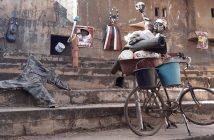After Wesh wesh, ça me regarde! (2002) in which he, as an insider, offers a different viewpoint on the deprived estates, Rabah Ameur-Zaïmeche goes to the bled, his native village in the far east of Africa, and there finds a way to broaden and remarkably elevate his vision of cinema. Neither sociological nor pure fiction, its apparent roughness may be disconcerting but it is eminently worth seeing because it in fact leads to a new understanding, beyond clichés and projections.
Like in his previous film, Ameur-Zaïmeche films on video and plays Kamel, deported from France when he comes out of prison. At first, he has the physical casualness of his perception of things. He is quite happy to share the village’s rhythm, where time passes differently, from having tea on the terrace to the zerda ritual where an ox is sacrificed in front of the assembled community and the meat divided in equal shares on a carpet of olive branches.
But, echoeing the blood that flows during the zerda, his cousin Bouzid’s life is also violently threatened by young fundamentalists who find him blind drunk. Intolerance radically shapes his native society. Bouzid beats his sister Louisa because she humiliates her family by leaving her husband. Road blocks are erected on the approaches to the village to control the comings and goings. Patriarchy wields its devastating influence and each dominates the other.
Those bodies under duress are what Ameur-Zaïmeche finds interesting. He focuses more and more on their rifts that ultimately lead to an overflow of boundless lunacy. In the asylum where Louisa is shut away, women sing that the real lunatics are outside. But his conclusion is not necessarily damning. Kamel is no-one’s victim, not France’s nor Algeria’s – he is simply someone who wants to find his roots but runs aground, like the rusted liners on the shore. His exile is a deafening guitar whose wild electric echoes fail to produce a harmony. He wishes he could bathe with the women without giving it a second thought, without having to pit himself against the men. He dreams of an Algerian land that would accept his femininity so he could stop seeing only the dark side of things. For that, he makes a tense and subtle film, quivering with desire for possibilities that are not yet for on the horizon.








